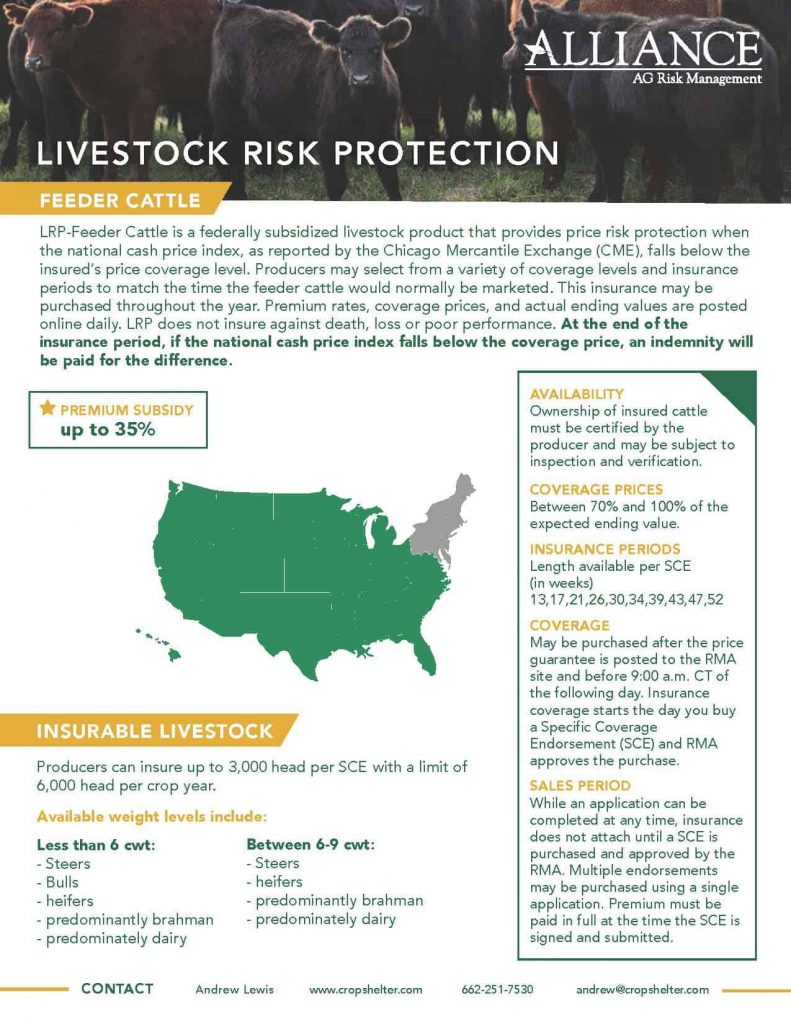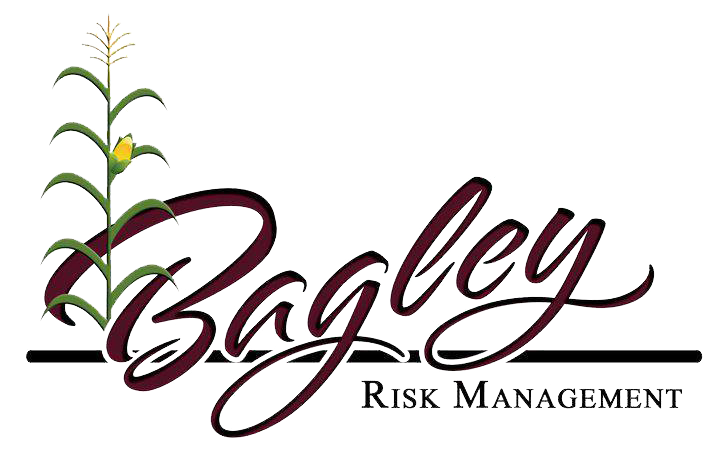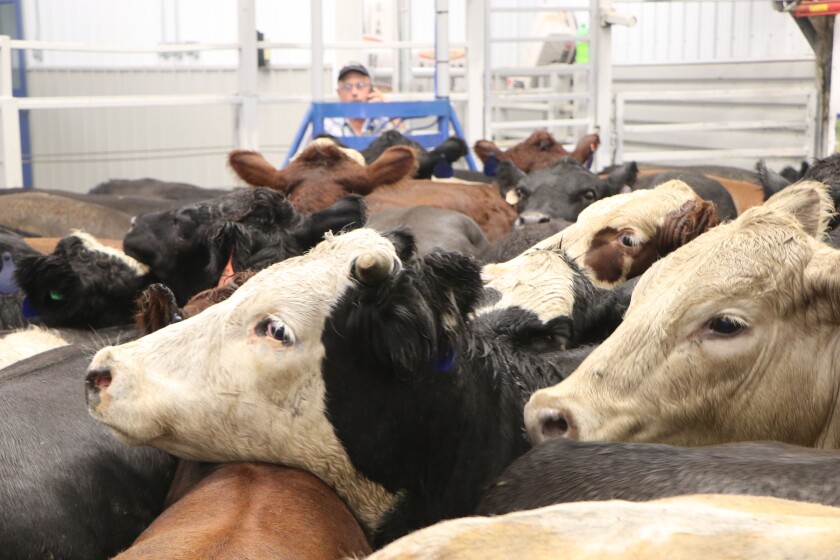Understanding Livestock Threat Defense (LRP) Insurance Policy: A Comprehensive Overview
Navigating the realm of animals risk protection (LRP) insurance can be a complex venture for numerous in the farming industry. From exactly how LRP insurance policy functions to the different insurance coverage alternatives readily available, there is much to uncover in this detailed guide that might possibly form the means livestock manufacturers approach threat monitoring in their services.

Exactly How LRP Insurance Functions
Periodically, comprehending the auto mechanics of Livestock Danger Defense (LRP) insurance can be complex, however breaking down exactly how it functions can provide quality for farmers and ranchers. LRP insurance policy is a risk management device created to secure livestock producers versus unanticipated price declines. The policy allows manufacturers to establish a protection level based upon their specific requirements, picking the number of head, weight variety, and insurance coverage cost. Once the policy remains in place, if market rates fall below the protection rate, producers can submit a claim for the difference. It is very important to note that LRP insurance coverage is not a profits assurance; instead, it concentrates only on rate danger protection. The insurance coverage period generally varies from 13 to 52 weeks, supplying versatility for manufacturers to select a duration that straightens with their manufacturing cycle. By using LRP insurance coverage, ranchers and farmers can mitigate the economic risks related to rising and fall market value, ensuring better stability in their operations.
Eligibility and Protection Options

When it concerns coverage choices, LRP insurance policy supplies manufacturers the flexibility to pick the coverage level, insurance coverage period, and recommendations that ideal match their risk administration demands. Insurance coverage degrees commonly vary from 70% to 100% of the expected finishing worth of the insured livestock. Manufacturers can likewise choose protection periods that line up with their production cycle, whether they are guaranteeing feeder livestock, fed cattle, swine, or lamb. Recommendations such as rate threat defense can further customize protection to protect versus damaging market fluctuations. By understanding the qualification standards and coverage alternatives available, livestock manufacturers can make educated decisions to manage danger properly.
Advantages And Disadvantages of LRP Insurance Policy
When examining Livestock Risk Protection (LRP) insurance policy, it is essential for animals producers to weigh the advantages and drawbacks fundamental in this danger management tool.

Among the key advantages of LRP insurance coverage is its capacity to provide protection against a decrease in animals prices. This can assist secure manufacturers from monetary losses resulting from market fluctuations. In addition, LRP insurance supplies a degree of adaptability, enabling producers to customize insurance coverage degrees and plan periods to match their details demands. By locking in a guaranteed rate for their livestock, manufacturers can much better take care of threat and prepare for the future.
Nevertheless, there are also some downsides to think about. One constraint of LRP insurance coverage is that it does not secure versus all sorts of risks, such as disease outbreaks or all-natural catastrophes. Moreover, costs can occasionally be pricey, particularly for producers with big animals herds. It is crucial for manufacturers to thoroughly evaluate their specific threat direct exposure and economic situation to establish if LRP insurance coverage is the right threat monitoring tool for their procedure.
Comprehending LRP Insurance Policy Premiums

Tips for Optimizing LRP Advantages
Maximizing the benefits of Livestock Risk Protection (LRP) insurance coverage calls for strategic planning and aggressive risk management - Bagley Risk Management. To make the many of your LRP insurance coverage, consider the adhering to pointers:
Consistently Assess Market Conditions: Stay notified regarding market fads and rate fluctuations in the animals industry. By checking these variables, you can make informed decisions concerning when to buy LRP insurance coverage to secure versus possible losses.
Establish Realistic Insurance Coverage Degrees: When picking coverage levels, consider your production expenses, market price of livestock, and possible dangers - Bagley Risk Management. Setting realistic coverage degrees ensures that you are sufficiently protected without overpaying for unnecessary insurance policy
Expand Your Coverage: Instead of counting solely on LRP insurance, take into consideration expanding your risk administration strategies. Combining LRP with other threat monitoring tools such as futures contracts or options can provide extensive protection against market unpredictabilities.
Evaluation and Change Protection Regularly: As market problems change, occasionally assess your LRP protection to ensure it aligns with your existing threat direct exposure. Readjusting protection degrees and timing of acquisitions can aid enhance your threat protection strategy. By adhering to these ideas, you can make the most of the advantages of LRP insurance coverage and safeguard your animals procedure against unanticipated risks.
Verdict
Finally, livestock danger defense (LRP) insurance view publisher site coverage is an important device for farmers to manage the economic risks related to their animals operations. By recognizing exactly how LRP functions, eligibility and insurance coverage options, along with the pros and cons of this insurance policy, farmers can make enlightened decisions to safeguard their incomes. By carefully considering LRP premiums and implementing techniques to make best use of benefits, farmers can mitigate prospective losses and make sure the sustainability of their procedures.
Livestock producers interested in acquiring Animals Threat Security (LRP) insurance policy can explore a range of eligibility requirements and insurance coverage alternatives tailored to their particular livestock procedures.When it comes to coverage options, LRP insurance policy provides producers the versatility to pick the insurance coverage level, insurance coverage duration, and recommendations that best suit their risk management needs.To understand the ins and outs of Animals Danger Defense (LRP) insurance policy totally, recognizing the variables affecting LRP insurance policy costs is essential. LRP insurance coverage costs are figured out by different aspects, including the coverage degree picked, the anticipated cost of livestock at the end of the insurance coverage period, the kind of animals being guaranteed, and the size of the coverage period.Review visit this site right here and Adjust Insurance Coverage Routinely: As market problems alter, regularly evaluate your LRP insurance coverage to guarantee it aligns with your current threat direct exposure.
Comments on “Bagley Risk Management Solutions: Your Guard Versus Unpredictability”